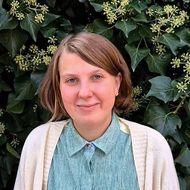'Why Data Analysis Is Art': HSE University-St Petersburg Hosts International School on Statistics
Why do statistical methods sometimes yield unexpected results? How does the creative approach help to process data in complex linguistic research? Is there 'a magic button' to analyse the results? The answers to these and other questions were the topic of the three-day autumn school 'Statistics in Psycho- and Neurolinguistics'.

The intensive course for students, young neurobiologists, psychologists, sociologists, and linguists was organised by the team of the Centre for Language and Brain at HSE University-St Petersburg. This July, the project won the grant from the HSE Corporate Academy. The event gathered more than 50 experts from different HSE campuses, Lomonosov Moscow State University, the University of Nova Gorica (Slovenia), and other educational institutions. The central topic of the autumn school was modern methods of data analysis for research.

Svetlana Alexeeva
Director of the Centre for Language and Brain at HSE University-St Petersburg
According to Svetlana Alexeeva, director of the Centre for Language and Brain at HSE University-St Petersburg, the eventful programme allowed the participants to improve their skills in using various tools of data analysis: 'This is why we created this school—to provide researchers with high-quality knowledge and skills for steady work with quantitative data. The invited colleagues—renowned experts—have contributed significantly to the content of the event. The participants highlighted that the topics of data visualisation and generalized models were of direct practical use, and they even reconsidered the approaches to their research'.

Natalia Slioussar
Leading Research Fellow of the Centre for Language and Brain at HSE University-St Petersburg
Natalia Slioussar, leading research fellow of the Centre for Language and Brain at HSE University-St Petersburg, shared the examples from their practice. She said that complex linguistic research requires a creative, extraordinary approach: 'I always wanted to have a magic button: plan the research properly, do everything well, press the button—and everything gets calculated correctly, and I simply get the result. However, there is no such universal way. It is vital to understand why statistical methods sometimes yield unexpected results'.
One of the working directions of the school was the course on mixed linear models and contrast encoding. The classes were delivered by Anastasia Lopukhina, postdoctoral fellow at the Royal Holloway (the UK), and Tatyana Bolgina, junior research fellow at the Centre for Language and Brain at HSE University. They presented the basics of simple and mixed linear regressions and shared the ways to compare models correctly.
Postdoctoral fellow Varvara Magomedova from the University of Nova Gorica explained to the participants the fundamental difference between the two approaches to data analysis. Traditional frequentist statistics gives a clear answer to the question of whether there are differences between the studied groups or not. The Bayesian method assesses the degree of confidence in findings and allows us to correct them as new data become available.
In the framework of the project 'Data Visualisation', the participants discussed how to transfer the research results efficiently according to the schedule. Mariya Khudyakova, director of the Center for Language and Brain at HSE University-Nizhny Novgorod, shared the life hacks that can help to catch the attention of the audience, using illustrations and graphics.
For the participants, the school also became a space for networking. Young researchers could find like-minded people with similar research interests.
'I was glad to explore new topics for me: methods of generalised additive models and Bayesian statistics. During the lectures, I managed to structure my knowledge. The informal part was also very useful and included private discussions with colleagues and experience exchange', said Polina Pilipets, research assistant of the Center for Language and Brain at HSE University.
The Center for Language and Brain at HSE University-St Petersburg plans to hold the school classes regularly. Next year, they are to hold an event covering the processing of EEG data for linguists, sociologists, and neurophysiologists.

